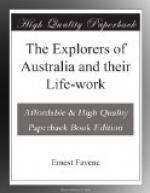At the termination of the original expedition, or rather before its conclusion was absolutely determined on, L.A. Wells made a flying trip into the district lying between Giles’s track of 1876 and Forrest’s route of 1874. Starting from his depot at Welbundinum, he completed the examination of what was practically the whole of the still unexplored portion in about six weeks, between the 23rd of February and the 4th of April. During this expedition he travelled 834 miles, discovered some fine ranges and hills, a large extent of pastoral country, some apparently auriferous land, but no water of a permanent kind. The results were indeed very promising, more valuable than those of the original Elder Expedition, and Wells, whose hopes had risen with the success, was intensely disappointed to find on his return that the expedition had been disbanded. Both Lindsay and Wells were natives of South Australia, Lindsay having been born at Goolwa, and Wells at Yallum station in the south-east, which was owned by his father and uncle. Wells joined the Survey Department of South Australia when but eighteen, and at twenty-three was appointed assistant-surveyor to the North Territory Border expedition. On the settlement of the border question he returned to Adelaide, and is now engaged on the Victoria River.
20.3. WELLS AND CARNEGIE IN THE NORTHERN DESERT.
[Illustration. L.A. Wells. Photo: Duryea, Adelaide.]
By this time the gold rush to the southern portion of Western Australia had set in strong, and the country that had so long repelled the pastoral pioneer by its aridity was now overrun with prospectors, their camps supplied with water by condensers at the salt lakes and pools. At first the loss of life was very great; for it was not likely that a district that could be safely traversed only by the hardiest and most experienced bushmen would freely yield its secrets to untried men. Of the many deaths that occurred from thirst, no complete record will ever be available. Some unrecognisable and mummified remains may some day be found amid the untrodden waste; but few have yet been tempted to break in upon the solitude of the dead men of the desert.




